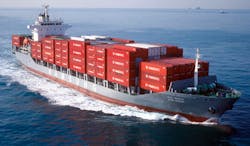The U.S. Department of Commerce’s Bureau of Industry and Security announced it will allow vessels to transport authorized cargo from the U.S. to Cuba and then sail to other countries with any remaining cargo that was onloaded in the United States.
Prior to this containers loaded in the U.S. on a ship stopping in Cuba were considered a “temporary export” that required obtaining a separate license in Cuba even if the container was not offloaded there.
There is however a 180-day rule, which bans ships that have stopped in Cuba from calling at a U.S. port for 180 days except under certain circumstances for which a special license is required, such as the delivery of agricultural or medical goods.
At the same time, the U.S. Department of the Treasury’s Office of Foreign Assets Control (OFAC) will also expand the existing authorization for “business presence” (such as a joint venture) to include exporters of goods that are authorized for export or re-export to Cuba or that are exempt, entities providing mail or parcel transmission services or cargo transportation services, and providers of carrier and travel services to facilitate authorized transactions.
The revised regulations will also clarify that the physical and business presence authorizations permit exporters and re-exporters of authorized or exempt goods to assemble such goods in Cuba. BIS will make conforming changes to generally authorize exports and re-exports of eligible items to establish and maintain a physical or business presence that is authorized by OFAC.
In the vein of trade the agency will offer a licensing policy of case-by-case review for exports and re-exports of items that would enable or facilitate exports from Cuba of items produced by the Cuban private sector.
OFAC will expand the existing authorization for “physical presence” (such as an office, retail outlet, or warehouse) to include entities that engage in authorized humanitarian projects, entities that engage in authorized non-commercial activities intended to provide support for the Cuban people, and private foundations or research or educational institutes engaging in certain authorized activities.
